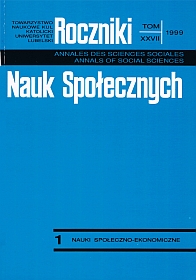Deconstruction and Perspective of a Great Come-back. Postmodernism and a Critical Analysis of Capitalism in Daniel Bell's Approach
Abstract
The postmodernist turn is connected with criticism of the positivist paradigm of sociology that has prevailed until now. Proposing the thesis that a fundamental social change has occurred, its supporters say that in such a situation the modernist notions used up till now in sociology have become inadequate. They postulate their radical transformation, so as to enable them to describe the emergent and dynamic reality of the postmodernist period. After rejecting the scientist standards of precision and the technical language sociology is to be included in a broad social discourse in order to support pluralism and tolerance with the help of literary means.
Daniel Bell's sociology, forming an alternative for the two competing paradigms, allows one to look at them as realisation of two opposite methodological options: presenting a full range and complexity of the phenomenon – an exact description and reductive explanation. Rejecting the limitations of the scientistic methodology Bell presents a sociology that is engaged in social change, critical of both the modernist and postmodernist postulates. The perspective of a “great come-back” to the sacred sources of culture that he outlines is a neo-conservative alternative for the postmodernist perspective of diffusion and deconstruction.
References
Bauman Z.: Socjologiczna teoria postmoderny. W: Postmodernizm w perspektywie filozoficzno-kulturowej. Red. A. Zeidler-Janiszewska. Warszawa: Instytut Kultury 1991 s. 7-25.
Bauman Z.: Wieloznaczność nowoczesna − nowoczesność wieloznaczna. Warszawa: PWN 1995.
Bauman Z.: Florian Znaniecki, nasz współczesny. W: Teoria socjologiczna Floriana Znanieckiego a wyzwania XXI wieku. Red. E. Hałas. Lublin: TN KUL 1999 s. 97-110.
Bell D.: The End of Ideology. Glencoe: Free Press 1960.
Bell D.: The Coming of Post-Industrial Society. New York: Basic Books 1973.
Bell D.: Kulturowe sprzeczności kapitalizmu. Warszawa: PWN 1994.
Berg A. van den: Liberalism without Reason? „Contemporary Sociology” 26:1996 nr1 s.19-27.
Best S., Kellner D.: Postmodern Theory. Critical Interrogations. Houndmills−Basingstoke−Hampshire: Macmillan 1991. http://ccwf.cc.utexas.edu/∼kellner/pm/pm.html.
Bloom A.: Umysł zamknięty. Poznań: Zysk i S-ka 1997.
Brown R.: Socjologia. W: Przewodnik po współczesnej filozofii politycznej. Red. R.Goodin, P. Pettit. Warszawa: Książka i Wiedza 1995 s. 124-166.
Casanova J.: Public Religions in the Modern World. Chicago−London: University of Chicago Press 1994.
Clough P.: Feminist Thought: Desire, Power and Academic Discourse. Cambridge: Blackwell 1994.
Dziamski G.: Dwie perspektywy postmodernizmu. W: Postmodernizm w perspektywie filozoficzno-kulturowej. Red. A. Zeidler-Janiszewska. Warszawa: Instytut Kultury 1991 s.43-52.
Eliade M.: W poszukiwaniu i znaczenia religii. Warszawa: KR 1997.
Foucault M.: Historia seksualności. Warszawa: Czytelnik 1995.
Hałas E.: Obywatelska socjologia szkoły chicagowskiej. Lublin: RW KUL 1994.
Heisenberg W.: Część i całość. Warszawa: PIW 1979.
Hindess B.: Marksizm. W: Przewodnik po współczesnej filozofii politycznej. Red. R.Goodin, P. Pettit. Warszawa: Książka i Wiedza 1995 s. 407-431.
Krasnodębski Z.: Postmodernistyczne rozterki kultury. Warszawa: Oficyna Naukowa 1996.
Krasnodębski Z.: Upadek idei postępu. Warszawa: PIW 1991.
Lyotard J.: Kondycja ponowoczesna. Raport o stanie wiedzy. Warszawa: Fundacja Aletheia 1997.
Mokrzycki E. (Red.): Kryzys i schizma. Antyscjentystyczne tendencje w socjologii współczesnej. Warszawa: PIW 1984.
Rorty R.: Przygodność, ironia i solidarność. Warszawa: Spacja 1996.
Seidman S.: The End of Sociological Theory. W: The Postmodern Turn: New Perspectives on Social Theory. Red. S. Seidman. Cambridge: University Press 1994.
Szahaj A.: Nadzieja w postnowoczesności. Poglądy Zygmunta Baumana na mapie stanowisk w kwestii oceny postmodernizmu. W: Trudna ponowoczesność. Rozmowy zZygmuntem Baumanem. Cz 1. Red. A. Zeidler-Janiszewska. Poznań: Humaniora 1995 s. 123-136.
Turner R., Killian L.: Collective Behavior. Englewood Cliffs, N.J.: Prentice Hall 1962.
Copyright (c) 1999 Roczniki Nauk Społecznych

This work is licensed under a Creative Commons Attribution-NonCommercial-NoDerivatives 4.0 International License.


